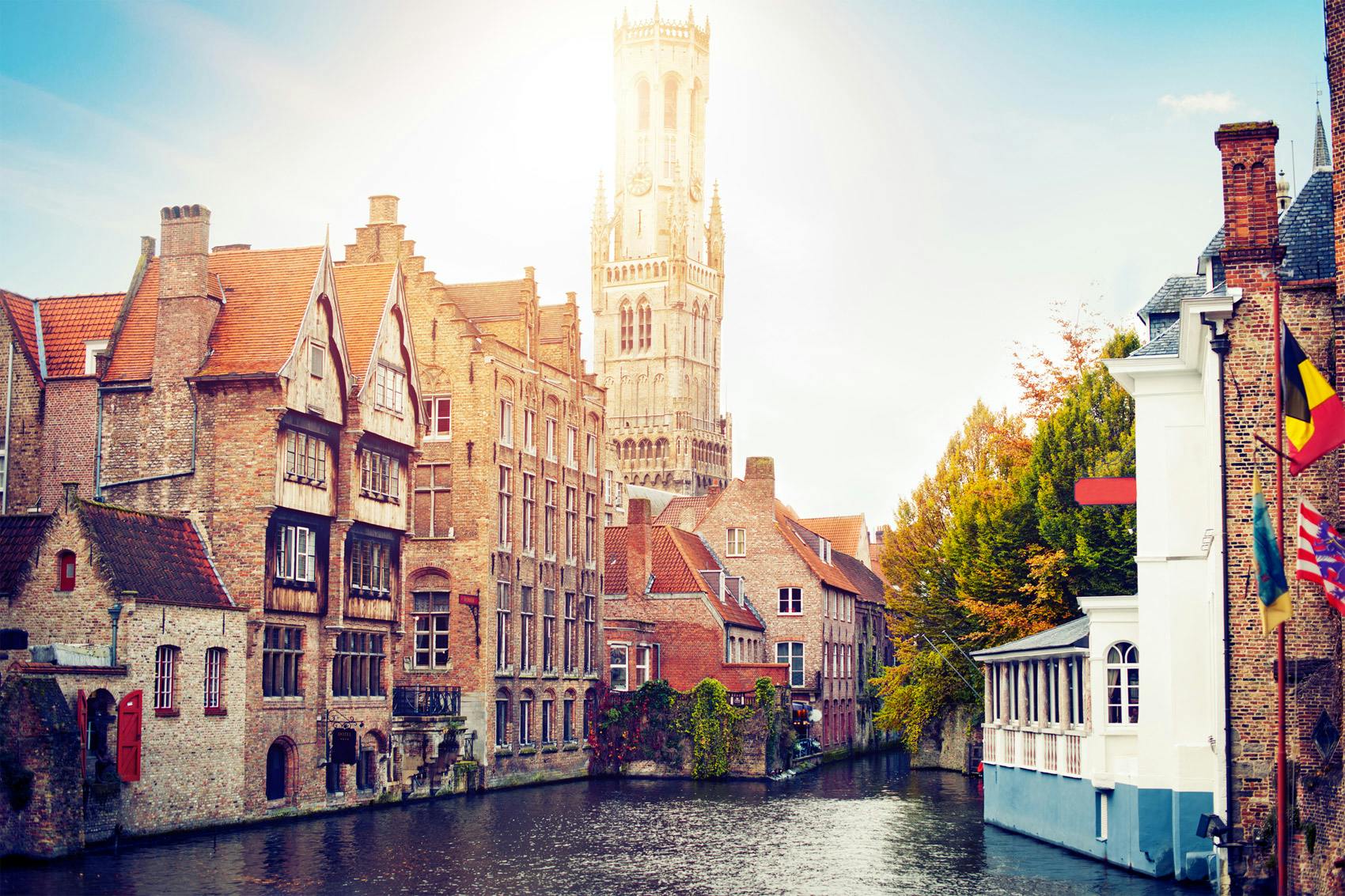Work in Belgium
Belgium boasts a strong economy anchored by its public sector. With a shortage of skilled workers, now would be a great time for graduates to enter one of its thriving industries
Often referred to as the 'heart of Europe', Belgium, though small in size, boasts a strong economy. With a population of approximately 11.8 million, including an estimated 1.4 million expats, it's a multicultural hub where diverse traditions and languages come together.
As a federal state, Belgium is divided into three distinct regions:
- Flanders in the north
- Brussels-Capital Region in the centre
- Wallonia in the south.
This cultural landscape is reflected in its three official languages: Dutch, French, and German. While English is widely spoken, especially in business and international circles, having a grasp of one of the official languages can enhance your experience and career prospects.
From the historic charm of Brussels to the picturesque landscapes of the Ardennes, Belgium offers a rich tapestry of experiences. When seeking employment in Belgium, it's important to embrace its diversity, appreciate its unique culture, and be open to the many opportunities it has to offer.
Jobs in Belgium
Belgium's job market, especially in Brussels, is highly competitive. As the headquarters for the European Union (EU) and the North Atlantic Treaty Organisation (NATO), the city attracts an array of international professionals. Fluency in at least one of Belgium's official languages (Dutch, French, or German) is essential for success in this environment.
Most Belgians work in the public sector, with significant representation in:
- banking
- law
- media
- retail
- tourism
- transportation.
However, job opportunities in the industrial sector are relatively limited. Belgium has a large expat community of over a tenth (13%) of the total population and welcomes workers from a range of industries.
Popular graduate jobs
- Engineering
- Pharmaceuticals
- Processed food and beverages
- Transportation equipment and motor vehicle assembly
- Textiles
Service and high-tech industries are concentrated in the Flanders region in the north, while coal and steel manufacturing are primarily found in the south.
Other large Belgian employers include:
- Ageas (insurance)
- Anheuser-Busch InBev (brewing)
- Bekaert (steel wires)
- Banque Nationale de Belgique (banking)
- Colruyt Group (food retail)
- D'Ieteren (vehicle distribution)
- Elia (energy)
- KBC Bank (banking)
- Proximus (telecommunications)
- Solvay (chemicals)
- UCB (biopharmaceuticals)
- Umicore (materials technology).
You can search for jobs in Belgium at:
In addition, jobs are advertised in newspapers of all three communities (Flemish, French and German).
Skills shortages
Belgium is experiencing a shortage of skilled workers across various sectors, creating a unique opportunity for global talent. This labour shortage has led to increased demand for professionals in fields such as:
- accountancy
- administration
- architecture
- engineering
- IT
- nursing and midwifery
- project management
- teaching
- technical and commercial sales.

How to get a job in Belgium
The Belgian application process mirrors the UK's, requiring:
- an application form
- a CV
- a cover letter in the relevant language
- references.
The process concludes with an interview.
Writing your job application in the appropriate language (Dutch, French, or German) is crucial, depending on your chosen place of residence and employment. While some organisations may accept English applications, it's always wise to confirm their language preferences before submitting your application.
Non-EU citizens seeking work in Belgium are advised to apply for jobs from their home country, as a job offer is often required for visa acquisition. Alternatively, they could secure a position with an international organisation based in their home country and then transfer to its Belgian offices.
If you currently reside in Belgium, you can register with recruitment agencies like:
- Adecco
- Randstad
- Michael Page.
Sector-specialist agencies are also available, and a list can be found on Golden Pages Belgium.
Each of Belgium's four regions has its own public employment office. You can receive professional career advice and search for jobs and training courses at:
Summer jobs
Belgium is a popular tourist destination, attracting visitors from around the globe. Cities like Brussels, Bruges, Antwerp, Ghent, and Ypres offer rich history and unique charm. This thriving tourism industry creates numerous job opportunities in hospitality, especially during the summer and part time throughout the year.
If you want to strengthen your CV, improve your language skills, and gain experience in multilingual environments, volunteering is a great option.
Teaching jobs
Belgium, with its multicultural landscape, is an ideal destination for TEFL (teaching English as a foreign language) teachers. The country's diverse educational landscape offers a wealth of opportunities for educators to share their knowledge and make a lasting positive impact on students of all ages.
To research TEFL opportunities, see:
Aspiring English teachers can also consider the British Council's English Language Assistants (ELA) Programme. It offers a unique opportunity to work as a language assistant in schools or higher education institutions across Belgium, sharing your English language expertise with students.
To be eligible, you must have completed most of your secondary education in the UK. You must also have completed at least two years of university education and have a B1 level in French.
Internships
In Belgium, internships are widely available and highly regarded. They offer a valuable addition to your CV and a stepping stone towards a successful career. Interns can work in several Belgian cities, such as:
- Zaventem
- Bruges
- Ghent
- Antwerp.
Organisations such as Deloitte and PwC provide internship opportunities for students and recent graduates in various fields, including:
- accountancy
- economics
- engineering
- IT
- law
- office management
- tax.
Programmes in Belgium offering internships include:
- AIESEC UK - a traineeship exchange lasting six weeks to 18 months for students and recent graduates, providing opportunities to work and volunteer in different countries.
- IAESTE UK - summer course-related placements for students in science, engineering, technology, and applied arts, allowing them to gain international experience and apply their academic knowledge.
- Euro Placements can also arrange internships and summer work placements for students in various fields, helping them to develop their skills and build their professional networks.
The UK government's Turing Scheme supports students seeking international work experience during the academic year. This scheme provides funding for students to undertake placements abroad, offering a unique opportunity to gain valuable work experience and cultural insights. Be sure to check if your university participates in the programme.
Belgian visas
Citizens of non-EU countries, including the UK, must obtain a visa and/or work permit to work in Belgium:
- Short-term visas are for those who intend to stay in Belgium for less than 90 days. These visas allow for tourism, visiting family and friends, or attending short-term business meetings or conferences.
- Long-term visas are for those who plan to stay in the country for more than 90 days. These visas are typically for students, researchers, or workers who have secured a job offer from a Belgian employer.
If you're applying for a long-term visa, you'll also need a work permit. Your potential employer will need to apply for this permit on your behalf, usually a year in advance. This process involves demonstrating that the position cannot be filled by an EU citizen and that the applicant meets the required qualifications and skills.
For information on work permits and the application process, see Belgium.be - Work permit.

Language requirements
There are three official languages in Belgium - Dutch (Flemish), French and German.
Dutch is spoken in the Flanders region to the north by the Flemish Community, but French is the first language for most citizens in Wallonia, which covers most of Belgium south of Brussels. French-speaking citizens are known as the French Community. German is also spoken in the southeast, where the German-speaking community of Belgium resides.
Although English is spoken widely in Belgium, many Belgians are bi or multilingual. Therefore, having a basic understanding of Dutch or French before you arrive can greatly enhance your experience and make it easier to settle in. Once you're in Belgium, you'll find opportunities to take language lessons and immerse yourself in the local culture.
How to explain your qualifications to employers
The Bologna Process ensures that your UK qualifications are recognised by employers. If you come from a country outside the European Higher Education Area (EHEA), you'll need to contact Ministere de la Federation Wallonie-Bruxelles or NARIC (Flemish Community) to get your certificates recognised.
Some professions may require you to have your qualifications officially recognised before you can start working. To check if your professional qualifications are recognised in Belgium, visit Europa or ENIC-NARIC - gateway to recognition of qualifications.
What it's like to work in Belgium
The average working week in Belgium is 38 hours, typically eight hours per day. Employees enjoy generous paid annual leave, with the number of days calculated based on the previous year's work. This allows for more extended breaks each year.
While Belgium offers favourable work conditions, the cost of living is relatively high, though still lower than the UK. Additionally, Belgium has one of Europe's highest income tax rates, leading to reduced take-home pay for employees.
There are ten public holidays in Belgium including:
- New Year's Day
- Easter Monday
- Labour Day
- Ascension Day
- Whit Monday
- Belgium Day
- Assumption Day
- All Saints Day
- Armistice Day
- Christmas Day.
Traditionally, Belgian management culture has leaned towards a French-style, top-down approach. However, a shift is underway towards a more open and democratic workplace, similar to the Dutch model. This trend emphasises increased delegation and employee involvement in decision-making.
Find out more
- Discover what it's like to study in Belgium.

